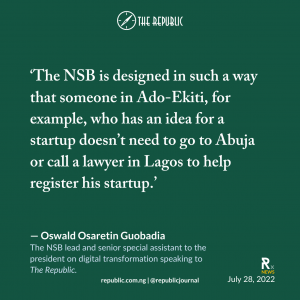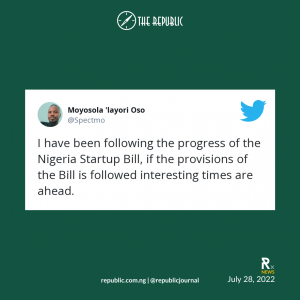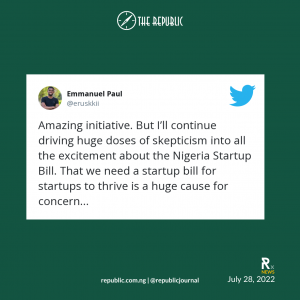The Nigeria Startup Bill is a joint initiative by President Muhammadu Buhari and a group of technology practitioners and policymakers which aims to provide an enabling environment for startups in Nigeria.
Yesterday, the Nigerian House of Representatives passed the Nigeria Startup Bill (NSB) after its third reading. This comes exactly one week (20 July 2022) after the bill was approved by the Senate. If approved by President Muhammadu Buhari, the bill will be written into law. Currently, the Kaduna and Lagos State governments have agreed to adopt and domesticate the NSB.
The NSB is a joint initiative by President Muhammadu Buhari and a group of technology practitioners and policymakers which aims to provide an enabling environment for startups in Nigeria. The ultimate goal is to position Nigeria as Africa’s leading digital technology centre. The bill also aims to support the creation, growth, and operation of startups in Nigeria by offering financial aid in the form of investment funding, tax cuts, grants, and credit guarantee programs.
The NSB aims to tackle issues many tech startups are currently facing in Nigeria and to ensure that Nigeria is a startup-friendly environment for both founders and investors to carry out business. Since its launch in May 2021 by the presidency, the bill has gathered support from all participating ministries, departments, and organizations as well as from both chambers of the National House of Assembly.
The bill provides that: a startup’s headquarters and its place of incorporation should both be in Nigeria; to qualify as a startup in the NSB the company must have been operating in Nigeria for no longer than 10 years; an NSB startup must have at least 51 per cent of its shares held by Nigerians and at least 15 per cent of expenses going into research and development; and the employees of the NSB startup should not exceed 100, excluding contract workers, consultants, and outsourced personnel.
Speaking to The Republic, the NSB lead and senior special assistant to the president on digital transformation, Oswald Osaretin Guobadia, gave some insights on the bill. He said: ‘What is critical for the success of the NSB is collaboration. It is a collaboration between the practitioners [startup founders] and the policymakers [government ministers]. This is what makes up the tech ecosystem. The NSB is designed in such a way that someone in Ado-Ekiti, for example, who has an idea for a startup doesn’t need to go to Abuja or call a lawyer in Lagos to help register his startup. The NSB will have an engagement portal that makes this possible and that connects investors with startups.’
Nigeria has one of the most appealing and successful tech hubs in Africa. With companies like Flutterwave and Paystack securing millions of dollars in investments, Nigeria’s tech hub has grown rapidly and has become one of the few beacons of hope for progression, especially among young Nigerians. Despite this, the tech business faces a number of regulatory challenges in addition to the lack of fundamental resources like a consistent power supply and funding.
In 2021, the Nigerian central bank banned cryptocurrency trading and later froze the accounts of four fintech companies claiming they were operating without a license and trading illegally sourced foreign currencies. Additionally, prohibited by state laws in Lagos in 2020, ride-hailing companies like ORide, Max.ng, and Gokada were forced to stop operations, with companies like Gokada later going into logistics and deliveries.
Guobadia also said that the idea of the NSB is to prevent policies like these from happening. With a national regulatory council which comprises the president, government ministers, and tech startup founders, the NSB aims to provide guiding policies that will support the growth of the tech ecosystem and ‘ensure the monitoring and evaluation of the regulatory framework that will encourage the development of startups in Nigeria.’
Some Nigerians have expressed what they think about the NSB. According to a Twitter user, [@]spectmo, ‘I have been following the progress of the Nigeria Startup Bill, if the provisions of the Bill is followed interesting times are ahead.’ Another user, [@]eruskkii said: ‘Amazing initiative. But I’ll continue driving huge doses of skepticism into all the excitement about the Nigeria Startup Bill. That we need a startup bill for startups to thrive is a huge cause for concern.’
According to a report by Technext, the startup bill may not solve all the problems that Nigeria’s startup are currently facing. For example, foreign investors find it difficult to invest in companies that are incorporated in Nigeria because of Nigeria’s security challenges and an unstable economy.
Established companies like Flutterwave, the Nigerian unicorn valued at over $3 billion, may not qualify for some of the benefits the NSB provides because a clause in the bill states that a startup’s headquarters and its place of incorporation should both be in Nigeria, whereas, Flutterwave’s headquarters is in San Francisco⎈
Editor’s note: As of the writing of this article, the Nigeria Startup Bill may have been updated or slightly changed since it was passed by both chambers of the National House of Assembly.
Recommended Reading
Here are some Republic articles to read for more context on Nigeria’s tech space:
The views, thoughts, and opinions published in The Republic belong solely to the author and are not necessarily the views of The Republic or its editors. We want to hear what you think about this article. Submit a letter to the editors by writing to [email protected].






